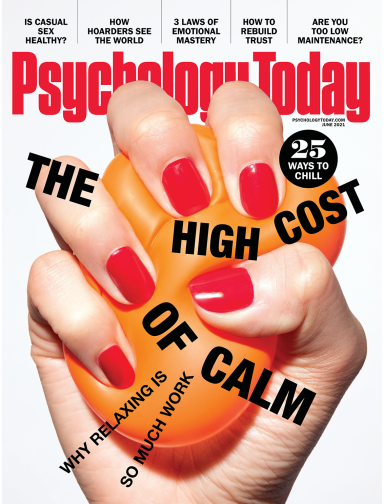Failure to Launch:The Puer Aeternus
When adulthood seems like too much.
Posted June 11, 2021 Reviewed by Kaja Perina
Key points
- The Puer Aeternus is the young man or woman who can’t quite grow up. In modern American literature we think of the Peter Pan syndrome.
- The brain is triggered by easy dopamine stimulation, which makes a person less likely to take on delayed gratification and hard work.
- Baby boomer parenting is backfiring: We’ve told children to find work that they like, and doing so can be hard.

Some souls have a tough time growing up, struggling to launch into adulthood.
It is heartbreaking for parents. It’s even more painful for those who are stuck.
- Consider the case of the Puer Aeternus.
Carl Jung:
As many of you may know, Carl Jung was a psychologist who studied under Sigmund Freud in the early part of the 20th century. He broke from Freud for a variety of reasons, and went on to create his own school of Jungian psychology.
Jung was interested in personality development and also posited the idea of archetypes; mythological or psychological structures that seem universal. Introvert and Extrovert are terms that Jung popularized – and the Shadow is another term that you may have heard.
The Puer Aeternus is the young man or woman who can’t quite grow up. In modern American literature we think of the Peter Pan syndrome - a form of this archetype. The Puer Aeternus understands that adult life calls, but it’s just too much to ask. It’s not just about being eternally youthful, it’s about the fear of entrapment, rules, and all the commitments often found in a meaningful adult life.
All of humanity participates in the developmental process. For instance, when starting kindergarten you get on the bus or you’re driven to school to join your class. You are probably quite attached to your mother or father, but you’re going to have to find a way into that class. Perhaps you will cry or be clingy. But over time, you find yourself in kindergarten or first grade enjoying your friends, and coming home without a fuss.
That’s a developmental accomplishment.
Separating from mother and father, and going to school. It is a huge step towards overcoming the normal attachment of early childhood, overcoming enmeshment and moving forward.
We have many such moments of development in our lives.
The call of adulthood is one of them.
Call to Adulthood
For the first 20 or so years of life, everything is laid out for us more or less. If we’re lucky we have a parent or two, and a supportive community. We are told what to do. Eat your dinner. Go to school. Get decent grades. Behave at home. Have some friends. Refrain from risky behavior like drugs, fast driving, and destructive relationships. Go to bed at a certain hour. Wake up. And do it all over again.
Since child labor laws were abolished, we don’t have to make money, find housing or obtain food. Things are basically supplied to us, and adulthood sits as some far off idea, that someday, somehow we will get to.
Deep inside, there’s anxiety.
All development is preceded by some anxiety. We may want to grow up, separate and overcome enmeshment, but we’re also scared about leaving what’s comfortable. Sometimes it’s conscious; often it’s not. Consider the many distractions that can bring a young person down.
- Destructive Relationships: Too many young folks get involved with relationships before they are ready; with a drama that is both preoccupying and distracting. How can one pay attention to school and other commitments when painful drama intrudes – abates – and intrudes again?
- Drugs Including Weed: I have nothing against the legalization of marijuana. But too often young people use it as a medication to avoid the anxiety that’s necessary to motivate. Often leading to avoidance - which can then lead to more anxiety, leading to more self medication - leading to more avoidance.
- Social Media & Video Games: The world keeps supplying young people with more methods of triggering dopamine, that addictive feeling of excitement. How many young people are up at 2 o’clock in the morning texting their friends, perusing the many platforms of social media, or locked into a game? And, then back at it the next night.
All made worse by quarantine, and the ever handy cell phone.
The notion of working hard at your studies, developing a skill, mastering a craft, excelling to the best of your ability in music or sports, requires commitment to a stable schedule over time.
The more the brain is triggered by easy dopamine stimulation, the less likely a person is to take on the delayed gratification and hard work required to master something, and experience the pleasure of a job well done. Add a psychological problem like attention deficit disorder, a mood disorder, anxiety or trauma - or just executive functioning issues, and the call of adulthood becomes more difficult.
It appears to be a growing problem.
The Changing Workplace
There’s another wrinkle; without question, the workplace has become more complex. 9 to 5 jobs that people keep for life are increasingly rare. Simple apprenticeships are not what they used to be. And a college degree is no guarantee. So who can blame people for smoking weed, playing video games, relationship drama or just avoiding the challenges of growing up?
With COVID-19 and quarantine some families have bonded, their children benefiting from online studies - finding ways to reach out despite isolation. On the other side is a cohort of young people we are now hearing about, who can’t quite find direction, live in resentment and doubt, lose self-esteem by the day, feel depleted - and avoid commitments at all costs.
In some ways baby boomer parenting is backfiring. We’ve told children to find work that they like; and now that it’s really hard, it’s a goal that seems out of reach. So, might as well go back to the drug, video game, relationship drama or avoidant behavior; it’s just too much.
This is the new Puer Aeternus and it hurts.
Need For Recalibration
Time for recalibration. It is terrific to be alive. It is terrific to be young. And like everything difficult we have to go through it and not around it. We have probably made too many promises to young people. It’s time for a recalibration. Growing up may be hard for many reasons. But adulthood does carry its own freedom.
- Staying an eternal child does not bring happiness.
Carl Jung told us of the Puer Aeternus. So this is not something new. The wish not to be bound. Not to be held back. Not to be entangled with rules. The wish to be free. But without the drive and commitment necessary to build something that can actually make one free. Becoming an adult is a developmental challenge like any other. It brings its own freedom. But it will not happen all by itself.
My Wish
That each person who has a bit of the Puer Aeternus within look in the mirror and make the choice to love the person they see. That special person - that person who has greatness within. There’s no need to go to some fancy school. Or be some genius or a wealthy entrepreneur. Just be a good version of yourself. Find that place inside - and move forward.
There is power there.
——-
I want to thank my friend and mentor James Hollis PhD, for educating me about the Puer Aeternus. Dr. Hollis is at the Jungian Center in Washington DC.













